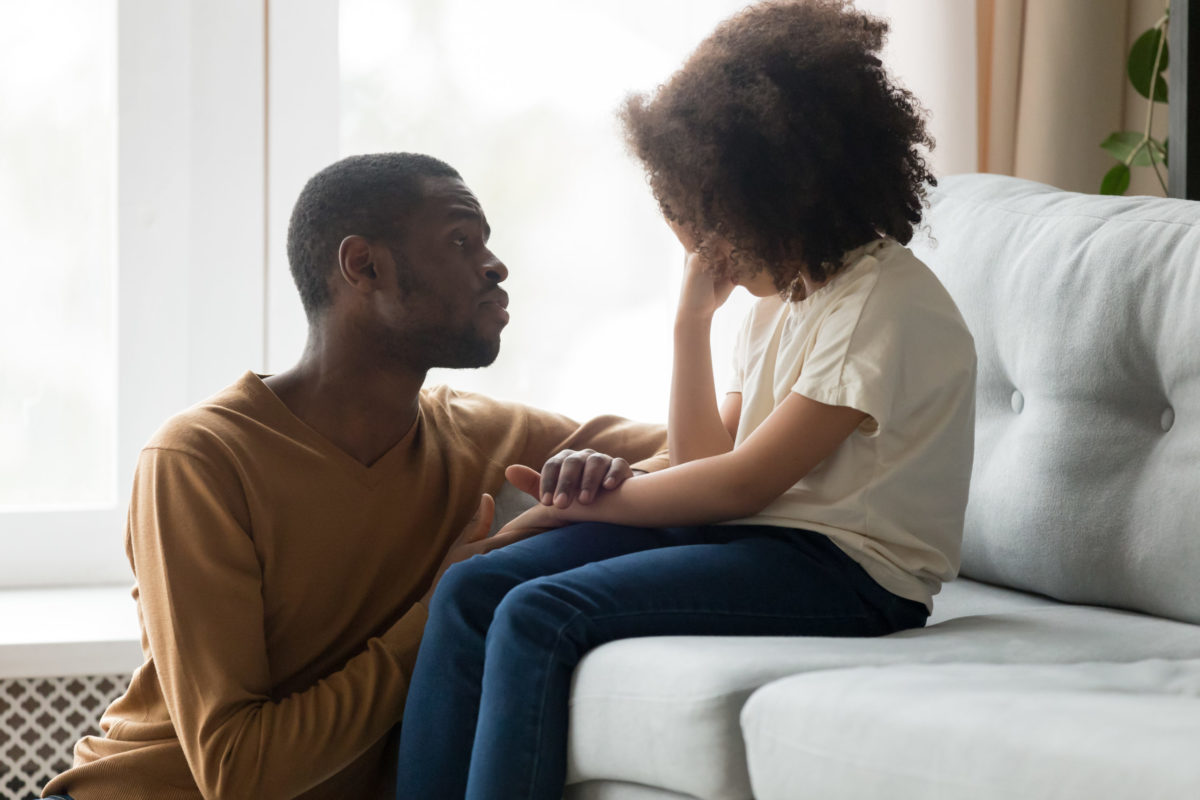If you need to talk with a counselor now, call the National Suicide Prevention Lifeline at 1-800-273-TALK (8255), a free, 24-hour line available to anyone in emotional distress. You can also reach the Lifeline using the short dialing code: 988.
Think about the last time your family lost someone you love.
How did you feel after it happened? Were you sad? Angry? Anxious? In denial?
Now think about how your partner responded. Were they in the same emotional place at the same time? What about your kids?
In traumatic situations, people process different things at different times, says Dr. Sharon Moore-Caldwell, a medical director for BlueCare Tennessee.
“Even when we’re going through the same thing, we receive and respond to things differently because no one else has your exact thoughts, feelings or circumstances,” says Dr. Moore-Caldwell. “And that includes events that happen to our society or communities as a whole.
“When a mass shooting or pandemic happens, it’s normal for one person to be in a deep depression while another wants to move past it quickly. In these times, it’s important to remember that no response is right or wrong — we all have to get through it in our own way.”
Collective trauma 101Collective trauma is a shared emotional reaction to a horrific event. When a traumatic event affects our whole society, we all experience that trauma to some degree. While our reactions differ depending on our culture and beliefs, the trauma itself is a collective experience. |
What are some examples of collective trauma?
Dr. Moore-Caldwell: Every generation has collectively traumatic events. For older generations, it might be WWII or the Vietnam War. For others, it might be 9/11, school shootings, or COVID-19.
How should you respond to collective trauma when it happens?
Dr. Moore-Caldwell: Every situation is different, but our response to all of them can start the same way:
- Check in with yourself
- Consider your community (whether that’s work, school, or just your immediate family)
- Offer support, not shame
5 steps for responding to collective trauma
1. Check in with yourself
Dr. Moore-Caldwell: You can’t help anyone until you help yourself. Get in tune with your body and your mind.
Ask yourself: Do I have a safe place to get help if I need it? Take some time to understand how you feel, and then turn your attention to others.
What is collective trauma? 5 steps to understanding your feelings
2. Listen
Dr. Moore-Caldwell: Next, try to be in tune with others. Listen to people carefully, and focus on treating everyone with value.
If you don’t know what to do in any situation, you can always listen until you’re ready to talk.
3. Look
Dr. Moore-Caldwell: Pay attention to all types of communication — not just what people say.
Look at people’s body language. Are they withdrawn? Do they seem anxious or angry? If you can read these cues, you’ll be able to see who’s engaged or withdrawn, which can help you see who needs help.
4. Offer support
Dr. Moore-Caldwell: When traumatic things happen, the knee-jerk reaction may be to assume everyone will have the same reaction we do. While that may be true in your immediate community (your family, your social circle), it won’t be true everywhere.
Come to people from a place of support, not shame. Don’t be condescending if someone expresses fear or anxiety. And don’t tell someone whether or not they should worry about something. Everyone’s feelings are valid and important.
5. Acknowledge and ask
Dr. Moore-Caldwell: The last, most important step is to acknowledge what’s going on and ask someone how they feel.
As a pediatrician with an adolescent medicine specialty, I started and ended visits with: How are you doing? It’s a great way to get kids to talk, but it works on everyone! Never underestimate the power of an open-ended question and the power of genuine concern.
When trauma happens:
| Do | Say |
| Acknowledge it | I can’t believe what happened today.
I’m feeling really scared/anxious after ___.
I know there’s a lot going on right now. |
| Ask open-ended questions | What do you think about ____?
How do you feel about your safety? What are some safe places for you to talk about it? Follow-up: What leads you to that conclusion? |
| Take action | Let me send you something I read that helped me.
Let’s find someone who can help. |
Dr. Moore-Caldwell: Again, these are tactics that are simple enough to use with kids but will work with anyone. We start with acknowledgement because not doing that can make it seem like we’re in the dark, in denial, or that we don’t care. Then, we use open-ended questions rather than specifics — questions that start with “how” or “what.” Not only do these prevent one-word answers, but they take the pressure off the person to have a certain answer.
Dr. Moore-Caldwell: Healthy responses to trauma always start with making room. Let the person know that the door is open, and let them choose how and when to walk through it.
Related from WellTuned: How grief affects your health
Get more information about specific health terms, topics and conditions to better manage your health on bcbst.com. BlueCross BlueShield of Tennessee members can access wellness-related discounts on fitness products, gym memberships, healthy eating and more through Blue365®. BCBST members can also find tools and resources to help improve health and well-being by logging into BlueAccess and going to the Managing Your Health tab.


